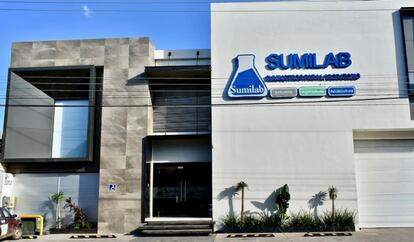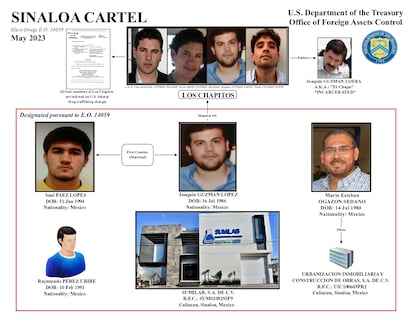A pharmaceutical company linked to Los Chapitos signed million-dollar contracts with the Sinaloa and federal governments
The company accused by the United States of aiding the Sinaloa Cartel has sold millions of pesos worth of precursor chemicals and laboratory equipment to Sinaloa governments and federal government agencies


One of the Mexican companies sanctioned by the United States and accused of being linked to “Los Chapitos” – the sons of Joaquín “El Chapo” Guzmán, heirs to the Sinaloa Cartel – has been revealed to be a supplier of both state and federal governments.
The top client of Sumilab S.A. has, in fact, been the government of the Mexican state of Sinaloa, the stronghold of the criminal organization founded by El Chapo. Between 2018 and 2022, the state administration – headed by Quirino Ordaz Coppel, now Mexico’s ambassador to Spain – awarded the company contracts for 14.7 million pesos, or $835,000.
According to 71 invoices published by the Government of Sinaloa on the National Transparency Platform, these purchases were made primarily through the Culiacán Hospital and the Sinaloan Institute of Educational Physical Infrastructure. Questioned about the delivery of the contracts to Sumilab, both the current government of Rubén Rocha Moya and former governor Quirino Ordaz Coppel declined to answer questions from EL PAÍS.
Sumilab – based in Culiacán, Sinaloa – sells chemical products and laboratory equipment.
On its website, the company claims to be a 100% Mexican-owned company with more than 33 years of experience… although, according to its articles of incorporation, it was created only 22 years ago. Sumilab purports to specialize in the production and distribution of substances, equipment and materials for all types of laboratories.
This past May 9, the Office of Foreign Assets Control (OFAC) of the United States Department of the Treasury included Sumilab on one of its blacklists. The US agency reports that the Mexican company has been flagged due to its participation in the supply and shipment of chemical precursors used for the production of drugs to members of the Sinaloa Cartel.
OFAC’s announcement of sanctions against Sumilab came the same day that the US Treasury Department also unveiled actions against Joaquín Guzmán López – one of El Chapo’s sons and one of the four members of Los Chapitos – and against three other members of the Sinaloa cartel, as well as one more company dedicated to real estate in the northwestern Mexican state. The implications of the OFAC designation range from blocking the sale of property and other assets, to prohibiting any transaction with or within the United States. Likewise, the Department of the Treasury clearly indicates that individuals who participate in certain transactions with the designated persons or firms may also face sanctions.

According to the contracts and invoices registered in Mexico’s National Transparency Platform, the Government of Sinaloa acquired chemicals and laboratory material to equip the Civil Hospital of Culiacán (the state capital) and several state universities, including the Technological University of Culiacán and the Polytechnic University of Valle del Évora, located in Guamúchil, Sinaloa. To these entities, the company linked to Los Chapitos sold packages of reagents, filters, acetates, materials, accessories and laboratory supplies, such as convection ovens and microscopes.
EL PAÍS contacted Andrés Castro, who was director of the Sinaloan Institute of Educational Physical Infrastructure (ISIFE) between January 2017 and May 2019, when Sumilab was given the first contract from the agency for a sum of 700,000 pesos ($40,000). Castro assured this newspaper that, during his tenure, ISIFE carried out contracting procedures in accordance with legal regulations and asserted that the participants complied with the requirements established in the bidding process. He says that he was unaware that the company was being investigated by the United States.
When Castro left ISIFE in 2019, the former governor of Sinaloa – Quirino Ordaz Coppel – appointed his then-secretary of sustainable development as the head of the institution: the former mayor of Ahome, Álvaro Ruelas. It was Ruelas – a member of the Institutional Revolutionary Party (PRI), one of Mexico’s three main political parties – who signed the documents with Sumilab when acquisitions were made for 12 million pesos, or $680,000.
For his part, Israel Martínez – director of the Culiacán Civil Hospital between 2019 and 2021 – confirmed the purchases made from the company linked to Los Chapitos, but emphasized that no chemical substances were purchased, only laboratory material. “Such operations were carried out based on the [contract] awards processes stipulated in the law, according to a purchasing committee to which [the firm] submitted itself for approval,” he clarifies.
Sumilab won more contracts between 2017 and 2021. The offices under the jurisdiction of incumbent Governor Rubén Rocha Moya – of the ruling National Regeneration Movement, or MORENA – have continued to acquire items from Sumilab. Documents indicate that, in 2022, the Government of Sinaloa purchased material from Sumilab valued at 871,00 pesos, or $50,000. Additionally, Sinaloa-based offices that are part of the federal government – led by President Andrés Manuel López Obrador, of MORENA – including two research centers belonging to the National Council of Humanities, Sciences and Technologies (Conahcyt) and branches of the National Water Commission (Conagua) and the National Institute of Forestry, Agriculture and Livestock Research (INIFAP) have purchased equipment and chemicals from Sumilab. Overall, from 2018 until the present, the company has received 2.7 million pesos – or $155,000 – from federal government entities, through the Food and Development Research Center (CIAD) and the Northwest Biological Research Center. When questioned by EL PAÍS, Conahcyt officials declined to comment on the purchases from Sumilab.
Likewise, to a lesser extent, health agencies and universities in the Mexican states of Sonora and Baja California Sur have also purchased chemicals and material from Sumilab in the last five years. Before 2017, the governments of these states acquired the company’s products, but the acquisitions increased post-2018, according to what is registered in the National Transparency Platform. The same is true of the federal government: before 2018, the only entity at the federal level that had contracts with the company linked to Los Chapitos was the Administration and Investment Trust to support scientific research and technological development at the National Institute of Forestry Research, Agricultural and Livestock, which depends on the Ministry of Agriculture and Rural Development (SADER), formerly known as the Ministry of Agriculture, Livestock, Fisheries and Food (SAGARPA).
When announcing the sanctions against Sumilab and four members of the Sinaloa Cartel, the US Treasury Department assured that this measure was closely coordinated with the Government of Mexico, including the Financial Intelligence Unit. The actions taken by the American government this past week are one more step to corner the heirs of El Chapo and the leaders of the Sinaloa Cartel – Alfredo, Iván Archivaldo, Joaquín and Ovidio Guzmán – who have been investigated since 2008. They are accused of trafficking large amounts of fentanyl into US territory.
Sign up for our weekly newsletter to get more English-language news coverage from EL PAÍS USA Edition
Tu suscripción se está usando en otro dispositivo
¿Quieres añadir otro usuario a tu suscripción?
Si continúas leyendo en este dispositivo, no se podrá leer en el otro.
FlechaTu suscripción se está usando en otro dispositivo y solo puedes acceder a EL PAÍS desde un dispositivo a la vez.
Si quieres compartir tu cuenta, cambia tu suscripción a la modalidad Premium, así podrás añadir otro usuario. Cada uno accederá con su propia cuenta de email, lo que os permitirá personalizar vuestra experiencia en EL PAÍS.
¿Tienes una suscripción de empresa? Accede aquí para contratar más cuentas.
En el caso de no saber quién está usando tu cuenta, te recomendamos cambiar tu contraseña aquí.
Si decides continuar compartiendo tu cuenta, este mensaje se mostrará en tu dispositivo y en el de la otra persona que está usando tu cuenta de forma indefinida, afectando a tu experiencia de lectura. Puedes consultar aquí los términos y condiciones de la suscripción digital.








































